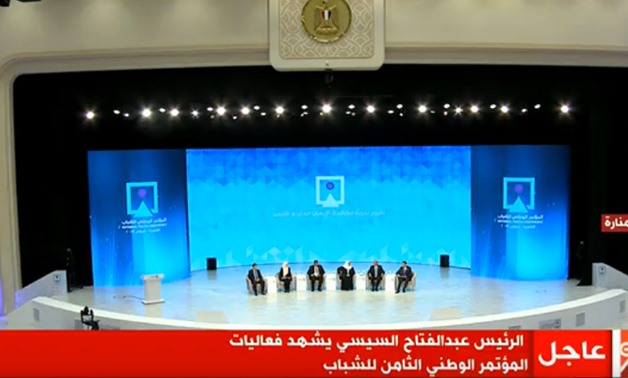
The opening session evaluates counter-terrorism efforts locally and regionally - TV screenshot
CAIRO – 14 September 2019: The development of terrorist organizations over the past decades in terms of number, structure and capabilities have been thoroughly discussed in the opening session of the eighth edition of the National Youth Forum Saturday.
The session started with a movie displaying the history of terrorist groups, highlighting the effect of the Muslim Brotherhood group’s ideology and “poisonous practices” in Egypt and the Middle East region.
As the world lost 60 million USD as a result of terrorism, the evolution of different structures and the change in the type of terror attacks over the years was the main topic of the main session, tackling how different groups employed technological innovation in their attacks, in addition to displaying Egypt’s experience in confronting these techniques.
Khaled Okasha, the head of the Egyptian Center for Strategic Studies, outlined the beginning of the qualitative change in the terrorist attacks, marking the 11 September 2001 attacks as a turning point that affected all attacks ensued.
“The period from 2001 to 2011 is important and highlights the first chapter in the international war against terrorism, led by the United States and followed by around 20 other countries,” Okasha said.
Okasha, who is also a member of the Supreme Anti-Terrorism Council, called the period from 2007 to 2011 as “the deceiving years,” where the world was watching, and mistakenly thinking terrorism was defeated, “while the truth was that terrorists were in latent mode, waiting for a spark to re-emerge again, and the spark happened when the so-called Arab Spring revolutions struck the region.”
He added that around 25 terrorist organizations were present at different squares, which witnessed mass protests against regimes at that time.
“Terrorism phenomenon should be thoroughly studied to raise youth awareness about it. We should not rely on the big success of the Egyptian state efforts in fighting terrorism, because we are still close to the danger circles of the extremism,” added Okasha.
“There should be parallel major nation-wide efforts equal in strength to the 2018 Sinai comprehensive operation, and engage the society in the protection process.”
Dalal Mahmoud, the director of the security and defense program at the Egyptian Center for Strategic Studies, said that during the period from 2011 to 2019, there has been a huge increase in the number of terrorists and types of attacks, as she quoted global statistics “that there are around 76-100 terror groups in 44 countries.”
She explained that following the Arab Spring revolts, terrorism has become a political player in the region, and its role strongly linked to the agenda and interests of the countries funding it.
Around 230,000 terrorists exist around the world, 46 percent of them are active in the MENA region, which has witnessed as the highest terrorism acts over the period from 2011 to 2019, Mahmoud added.
She continued saying that the MENA region has witnessed 33,000 terror acts, where more than 90,000 were killed during the period 2002-2017.
Other participants in the panel cited studies that Muslim Brotherhood founder Hassan el Banna’s ideology has been a reference to terrorist organizations that emerged in following years.
The session highlighted the phenomenon “Returnees from ISIS” in the west, replicating the “Returnees from Afghanistan.”Toqqa el-Naggar, a researcher at the Egyptian Center for Strategic Studies, said that the MENA region’s share of terrorists that joined IS group reached 18,300, adding that the returnees from ISIS are coming back to their countries as families and not single individuals as they left, in which children are born and raised in radical thoughts. She further noted that ISIS has a total of 4,700 women fighting in their group.
The eighth National Youth Conference kicked off Saturday, September 14 at New Cairo’s Al Manara International Conference Center at the presence of President Abdel Fatah al-Sisi.
A total of 1,600 participants are attending the conference. Those include members of the Presidential Leadership Program (PLP), university students, young politicians, young engineers working in national projects, young physicians, and young businessmen.
The one-day conference consists of three sessions. The first session evaluates counter-terrorism efforts locally and regionally, while the second session discusses the effect of spreading false information on the state as part of Fourth-generation warfare, and the third session will be dedicated to questions sent by citizens via online platforms to President Sisi who will be answering them in the session titled "Ask the President."
The seventh edition of the National Youth Conference having 1,500 participants was held in the New Administrative Capital (NAC) on July 30-31. The event hosted the commencement of the first class of the African Presidential Leadership Program (APLP).

Comments
Leave a Comment